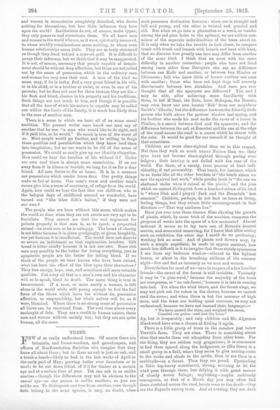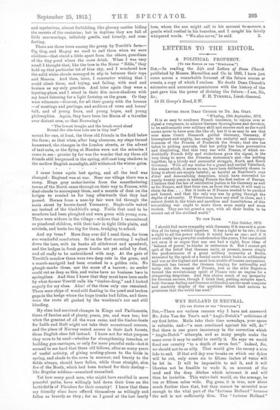TREES.
FEW of us really understand trees. Of course there are botanists, and forest-wardens, and gamekeepers, and officers of Reafforestation Societies who imagine that they know all about them ; but to these an oak is just an oak, and a beech a beech—likely to bud in the last weeks of April or the early part of May; growing better over limestone or in marl; to be out down (think of it!) for timber at a certain age and at a certain time of year. Yet one oak is es unlike another—though the differences may not be obvious to the casual eye—as one person is unlike another; as you are unlike me. To distinguish one tree from another, even though both belong to the same species, is easy, no doubt, when
each possesses distinctive features : when one is straight and tall and young, and the other is twisted and gnarled and old. But when we go into a plantation or a wood, or wander among the red pine boles in the spinney, we are seldom con- scious of the separate individualities of the trees about us. It is only when we take the trouble to look closer, to compare trunk with trunk and branch with branch and knot with knot, that we discover how greatly one tree may differ from another of the same kind. I think that we meet with the same difficulty in another connexion : people who have not lived among races other than European can see no difference between one Kafir and another, or between two Hindus or Chinamen; folk who know little of horses confuse one roan with another; those who have not kept dogs will scarcely discriminate between two Airedales. And have you ever thought that all the sparrows are different? You and I may be able, after achieving some familiarity with them, to tell M'Bani, the Zulu, from Mokapan, the Basuto; may even know our own hunter Bob' from our neighbour Smith's Charlie,' but the difference between the friendly little person who built above the parlour window last spring, and his brother who made his nest under the eaves of a house in Pimlico, is a secret between God and the sparrows; and the difference between the oak at Boscobel and the one at the edge of the wood across the road is a secret which he shares with the oaks. It would be good for our conceit if we thought of that sometimes.
Children are more clear-sighted than we in this respect. But then they walk so much nearer Nature than we : their eyes have not become short-sighted through poring over ledgers; their hearing is not dulled with the roar of the world. For them, of a surety, trees possess at least indi- viduality, if not personality. That beech, for instance, which to us looks like all the other beeches, is'" the beech where we saw the squirrel last week," while yonder larch is "the one we sheltered under when it rained at the picnic," and the pine which we cannot distinguish from a hundred others of its kind is " where Dick and I played Jack and the Beanstalk ' lost summer." Children, perhaps, do not look on trees as living, feeling things, but they obtain little encouragement in that direction That way madness lies."
Have you ever seen those cinema films showing the growth of plants, which, by some trick of the machine, compress the progress of weeks into the space of a few moments ? Almost indecent it seems so to lay bare one of Nature's dearest secrets, and somewhat unnerving, for I know that after seeing such an exhibition the other day I could do no gardening; weeding felt so cruel. And if plants and flowers may, by such a simple expedient, be made to appear sentient, how much less difficult is it to imagine that those stately sycamores I see from my bedroom window—vibrant to the lightest breeze, or silent in the breathing stillness of the summer night—live and feel as intensely as we men and women.
Nevertheless for most of us—save in respect of a few familiar friends—the secret of the forest is still inviolate. Variously it may be "a pine-wood," because the majority of the trees are evergreens, or " an oak-forest," because it is late in coining into leaf. Yet when the wind blows, and the forest sings, we may not pick out the voices in the chorus, because we cannot read the score; and when there is but the murmur of high noon, and the trees are holding quiet converse, we may not understand, because we have not learned their language:— " We have named the stars, and weighed the moon,
Counted our gains—and lost the boon."
Ay, lost it irreparably: and only children and Mr. Algernon Blackwood have even a chance of finding it again.
There is a little group of trees in the meadow just below Trevitt's farm. They are elms. There is something about elms that marks them out altogether from other trees. For one thing, they are seldom very gregarious; it is commoner to find them spaced along the hedgerows, or (like these) in a small group in a field, where they serve to give nesting-room to the rooks and shade to the cattle, than to see them in a multitude—in a forest. Then they are proud. Upstanding (a little top-heavy sometimes), strong, scorning to let the wind pass through them, but defying it with great masses of closely . woven foliage; unyielding—maybe recklessly courageous, so that of a March day you may often find them stretched across the road, heroic even to the death—they are the Bayards among trees. And at evening they are dark
and mysterious, almost forbidding, like gloomy castles hiding the secrets of the centuries; but in daytime they are full of little murmurings, infinitely gentle, and homely, and com- forting.
There are three trees among the group by Trevitt's farm- Og, Gog, and Magog we used to call them when we were children—that stand a little apart from the others, guardians of the tiny pond where the cows drink, When I was very small I thought that, like the tree in the Norse "Edda," they held up that particular bit of blue sky, and I wondered how the solid white clouds managed to slip in between their tops and Heaven. And then, later, I remember wishing that I could climb them, and trying, and failing, with mud and bruises as my only guerdon. And later again they were a trysting-place, and I stood in their dint moon-shadows with soy heart listening for a light footstep on the grass. Or they were witnesses—discreet, for all their gossip with the breezes —of meetings and partings, and auditors of vows and lovers' talk, and of young fears, and young hopes, and young philosophies. Again, they have been the Mecca of a traveller over distant seas, so that Browning's
"The lowest boughs and the brush-wood sheaf Round the elm-tree hole are in tiny leaf "
meant for one, at least, the three old friends in the field below the farm ; so that when, after long absences, my steps turned homeward, the changes in the London streets, or the advent of taxi-cabs, or the flying at Hendon were not the miracles I came to see : greater by far was the wonder that my three old friends still burgeoned in the spring, still cast long shadows in the mellow English moonlight, still withstood the winter gales.
•
I came home again last spring, and all the land was changed : England was at war. Near our village there was a camp. Huge grey motor-lorries from the manufacturing towns of the North came through on their way to France, with dust-clouds to accompany them, and a mantle of dust on the hedges to remind us for long afterwards that they had passed. Horses from a near-by fair were led through the main street by brown-faced Yeomanry. Bugle-calls waked inc instead of the blackbird's song. Fields that used to be meadows had been ploughed and were green with young corn. There were widows in the village—widows that I remembered as pinafored children, with their hair in tight little plaits, and satchels, and boots too big for them, trudging to school.
And my trees P More than over did I need them, for trees are wonderful comforters. SO on the first morning I walked down the lane, with its banks all stitchwort and speedwell, and the hedges in fresh green frocks not yet soiled by dust, and all reaay to be embroidered with may. At the gate of Trevitt's meadow there were two deep ruts in the grass, and a marsh-marigold had been crushed to a golden ruin. No plough-marks these, nor the score of a barrow; no seeder could cut as deep as this, and wains have no business here in springtime. And then I knew that they must have been made by what farmer Trevitt calls his "timber-drug," and I looked eagerly for my elms. Alas! of the three only one remained. There were chips of wood still floating in the pond and broken gaps in tho hedge where the huge trunks had fallen, and there were the roots all gashed by the woodman's axe and still bleeding.
My elms had survived changes in Kings and Parliaments, times of famine and of plenty, peace, yes, and wars too; but when the greatest of all the wars came, and the timber-boats for Leith and Hull might not take their accustomed courses, and the pines of Norway rested secure in their dark forests, these English elms fell instead. I know not for what purpose they were to be used—whether for strengthening trenches, or building gun-carriages, or only for more peaceful ends—but it seemed to me hard that these old fellows, after so many years of useful activity, of giving nesting-places to the birds in spring, and shade to the cows in summer, and beauty to the fields always, should have fallen, while those straight, slim firs of the North, which had been trained for their destiny— like Regular soldiers—remained unscathed.
Yet how many good men, who might have excelled in more peaceful paths, have willingly laid down their lives on the battlefields of Flanders for their country! I know that these my friendly elms have offered themselves as willingly and fallen as bravely as they ; for as I gazed at the last lonely tree, whom the axe might call to his account to-morrow, a gentle wind rustled in his branches, and I caught his faintly whispered words. " We also serve," be said, Z.



































 Previous page
Previous page